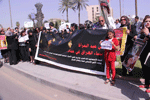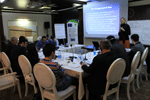Published on Thu, 2014-03-13 14:08
About two dozen Iraqi women have demonstrated in Baghdad against a draft law approved by the Iraqi cabinet that would permit the marriage of nine-year-old girls and automatically give child custody to fathers. The group's protest was on International Women's Day on Saturday (local time) and a week after the cabinet voted for the legislation, based on Shiite Islamic jurisprudence, allowing clergy to preside over marriages, divorces and inheritances. |
Published on Thu, 2014-03-13 10:27
The training on Gender-Responsive Budgeting, Budget Analysis and Policy Advocacy was organized for experts of National Budget Group (NBG) in Baku last February under the project: “Your Money, Your Future: Improving Public Finance Policy and Management in Azerbaijan”. The purpose of the training was to increase the awareness and knowledge of civil society experts about the public finance policy analysis and writing capacity, policy advocacy, gender-responsive budgeting and provide them with relevant information on the concept, tools and practices. |
Published on Thu, 2014-03-13 09:52
Despite commitments to enhance coherence of development, financial, monetary, trade, investment and other key policies, global economic policymaking remains fragmented and incoherent. “Coherence among the various areas of international policymaking is critical to ensuring that actions in one policy area do not undermine the goals or actions in another,” said a report released by the UN Independent Expert on Foreign Debt and Human Rights, Mr. Cephas Lumina (“the Independent Expert”) and prepared for the General Assembly. |
Published on Fri, 2014-03-07 07:17
Uruguayan president José Mujica meets with international civil society during a "strategy meeting" organized by Social Watch and demand action from the powerful governments of the world. February 2014, Montevideo. |
Published on Thu, 2014-03-06 13:15
A Feminist Declaration for Post 2015.As the United Nations decides on the future course of international development Post 2015, women of all ages, identities, ethnicities, cultures and across sectors and regions, are mobilizing for gender, social, cultural, economic and ecological justice, sustainable development and inclusive peace. We seek fundamental structural and transformational changes to the current neoliberal, extractivist and exclusive development model that perpetuates inequalities of wealth, power and resources between countries, within countries and between men and women. We challenge the current security paradigm that increases investments in the military-industrial complex, which contributes to violent conflict between and within countries. |








